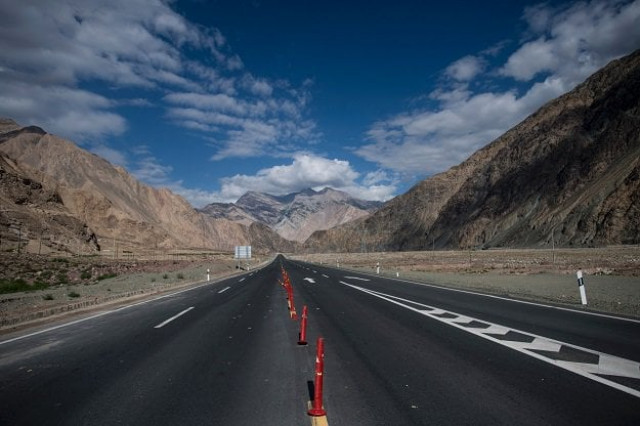Centre hides long-term CPEC plan from provinces
Ahsan Iqbal chairs stakeholders’ meeting to shape up projects ahead of 7th JCC

PHOTO: AFP
On Wednesday, the federal government arranged a meeting of the representatives of the federal and provincial governments as well as special regions of the country ahead of the 7th Joint Cooperation Committee – the highest decision-making body on CPEC.
Planning Minister Ahsan Iqbal chaired the meeting which was attended by Khyber-Pakhtunkhwa Chief Minister Pervaiz Khattak and representatives of all four provinces and the special areas of the country.
The pre-JCC meeting discussed progress on the implementation of all issues related to the $55 billion CPEC, except the LTP – the plan that will lay the foundation of cooperation between China and Pakistan till 2030.
Understanding the China-Pakistan Economic Corridor
Pakistan had shared the draft of the LTP with China early this year. Beijing has proposed some changes in the plan that the federal authorities have not accepted yet. In case the two sides say yes to the revised plan, the agreement will be signed during the 7th JCC meeting scheduled to take place on November 21 in Islamabad.
Minister for Planning and Development Ahsan Iqbal and Vice-Chairman NDRC Wang Xiatao will chair the meeting.
“The federal government neither shared the China’s feedback nor the revised LTP plan with the provinces in the pre-JCC meeting,” said an official of the provincial government on the condition of anonymity.
However, the planning ministry said the draft of the original LTP had already been shared with the provinces and there was no material change in the revised draft.
The LTP will cover all areas of cooperation – including connectivity, energy, trade and industrial parks, agriculture development and poverty alleviation, tourism, people to people contacts and financial cooperation.
Provinces given just a week for input on CPEC plan
The 7th JCC will review the reports of the LTP Working Group, Industrial Cooperation Working Group, Gwadar Working Group, Transport Infrastructure Working Group and Energy Working Group.
“It has been decided that all the federal and provincial governments would take a unanimous position in the upcoming JCC meeting,” said Iqbal after the meeting.
He added that Pakistan’s priority was that all the agreed projects should be completed on the given deadlines aimed at exploiting full benefits of CPEC.
The K-P chief minister called CPEC a project of whole of Pakistan, stressing that work on projects in K-P should be accelerated. He praised the National Highway Authority for building provincial road networks.
The planning minister said the Karachi Circular Railways and Main Line-I project of Pakistan Railways were the agreed projects of CPEC. He hoped that the Sindh government and the Pakistan Railways would resolve the outstanding issues in the next two days.
CPEC: debunking the naysayers
“The 7th JCC will give final approval of the $2-billion Karachi Circular Railway, provided the Sindh government and the Pakistan Railways are able to resolve a dispute over the rail corridor of the mass transit scheme,” said an official of the planning ministry.
In its last meeting held in Beijing in December 2016, the JCC agreed in principle to include the mass transit railway schemes of provincial headquarters in the CPEC framework, including the KCR project.
But there was a dispute over the KCR alignment that was overlapping the route of another critical CPEC project – upgrading of the railways existing main line from Karachi to Peshawar known as MLI.
According to the planning minister, where the KCR overlaps the MLI, a flyover will be built to resolve the issue.
The $8.2 billion MLI project was also facing some delays. It was planned to be completed in two phases between 2016 and 2020. The PC-I of the phase one of the project has not yet been submitted to the planning ministry for approval and hardly one week is left in the JCC meeting.
China-Pakistan Economic Corridor: ‘Long-term plan’ to be inked soon
The initial estimated cost of phase one of the project is roughly $3.2 billion.
The planning minister said that the Cross-border Fiber Optic Project (Khunjerab-Rawalpindi) would change the destiny of Gilgit-Baltistan. Work on the optical fibre had begun in October 2015 and would be completed in August 2018, he added.
During the meeting, the planning ministry showed his unhappiness over delay in the completion of a water desalination plant in Gwadar. The delay was on the part of the provincial government.
Some other projects like Iron Ore Mining, Processing and Steel Mills complex at Chiniot (Punjab) and Keti Bunder Sea Port Development Project (Sindh) were also not picking up pace.



















COMMENTS
Comments are moderated and generally will be posted if they are on-topic and not abusive.
For more information, please see our Comments FAQ